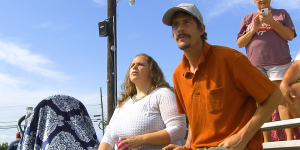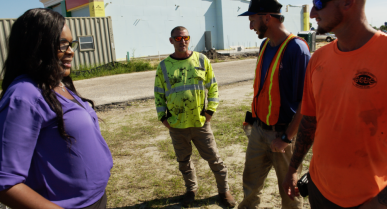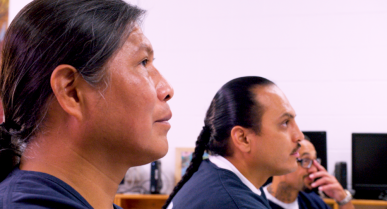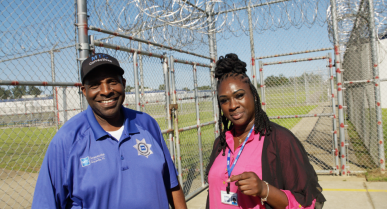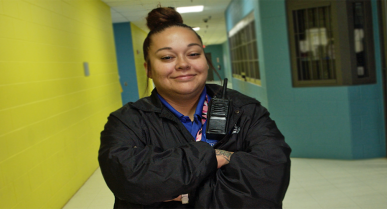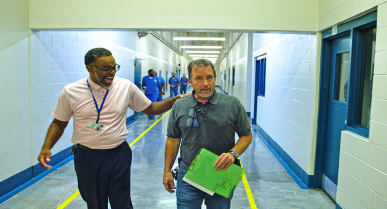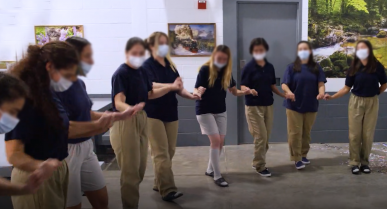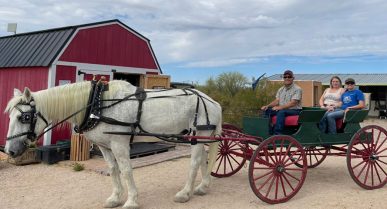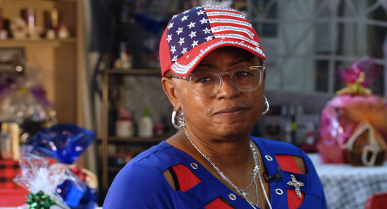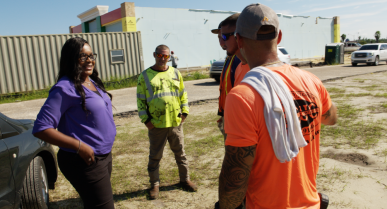A happy family thanks to a second chance, good choices, and caring individuals at Idaho CAPP
“If I can do it, anybody can do it. And that’s just the God’s honest truth.”
So said Abbott Frank, while chatting shortly after he and his family watched the football game of his young son, Ryver. Abbott’s a family man who, along with his wife Nicole, owns a garage door installation business in Arab, Alabama. It’s a picture-perfect fall day at the city league game where they cheer on Ryver and his team. Their little girl Delilah is a cheerleader, and baby Abbott, Jr. is just happy to be there, slurping up the snow cone he shares with his dad.
Things were not always so carefree and happy for this family. Instead of worrying about the score of the football game, or what treat they might grab on the way home, not so long ago, the Franks were navigating a traumatic period of their lives while Abbott served a sentence in MTC’s Idaho Correctional Alternative Placement Program facility.
“Life experience; if it doesn’t kill ya, it makes ya stronger. That’s a huge one, and I think that’s what life is all about; obstacles that you either make it through or you don’t.”
Before relocating to Alabama, the Franks lived in Idaho where Abbott’s addictions got him into trouble. Looking at doing hard time, a judge gave Abbott a break, allowing him to take advantage of the programming at Idaho CAPP.
“When I was going through that program,” recalled Abbott, “there’s a lot of fear. There’s a lot of times that you just don’t think that you’re going to make it. I know it’s arduous, and it’s a long program, but it works. I think MTC helped me make that ultimate choice. They helped me to see where it was in my life that I needed to make the changes. Standing in front of that class, and doing my exercises, and being in tears for six months of my life almost every single day was the absolute best thing for me. And I cannot say thank you enough.”
Released in 2014, Abbott has made remarkable progress as he’s reunited with his family and moved on with his life.
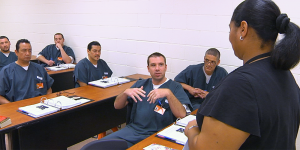 “As we progressed, and as (Nicole) and I progressed as a couple, I just realized even more and more how thankful I was to the powers that be to have given me that chance to go through this program and really learn why I chose to drink and be a menace to society, and what it was going to take to fix that.”
“As we progressed, and as (Nicole) and I progressed as a couple, I just realized even more and more how thankful I was to the powers that be to have given me that chance to go through this program and really learn why I chose to drink and be a menace to society, and what it was going to take to fix that.”
Brian Finn is the warden at the Idaho CAPP facility.
“Recently, we received a letter from Abbott Frank,” he said. “It was a letter of gratitude and appreciation for the opportunity he got at the Idaho CAPP facility. He really thanked the instructors, the officers, the administration. He took the time to really put out a well thought out letter, and really express everything he got out of CAPP, and that really says something about him. He got out, and what he’s saying is he’s practicing what he learned here.”
“Ultimately, the judge gave me a chance,” Abbot reflected, “and I got to go and be involved in this program. It ain’t easy. But I wouldn’t change it for the world. It’s what I needed. I needed somebody to stop my life for me, involuntarily, and diligently work hard on me. And MTC gave me that.”
“I think his experience is probably pretty representative of the rider program in Idaho,” Warden Finn said. “These guys are getting a second chance to go out and change their lives. We give them, really, six months to practice thinking differently, acting differently, so they can go out and actually do things differently, and really be a different person than when they came in the front door.”
Nicole gets emotional thinking of the difference the programming at Idaho CAPP made.
“I think it’s amazing. I think without it, actually, I have no idea where we would be. You just are given a series of choices, and you get to pick what road you go down based on whatever choice you pick. So faith is very important. That’s the only thing that got me through it, I know that. So having some kind of spirituality and believing in something that’s bigger than you is huge.”
“I’d just like to reiterate how thankful I am to the MTC staff,” Abbot concludes, “and to the staff of IDOC, to my judge, and ultimately the probation officer that I was assigned to when I got out. The fact that I was given another chance, the fact that I was given such high quality of treatment is the reason I have been successful.”
About Idaho CAPP Facility
Idaho CAPP Facility is accredited by the American Correctional Association—achieving
over 99% compliance for both mandatory and non-mandatory standards in its most
recent audit. Other accreditations and certifications include the Correctional Education
Association, National Commission on Correctional Health Care (NCCHC), and the
Prison Rape Elimination Act (PREA).
